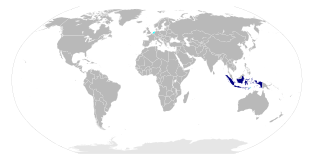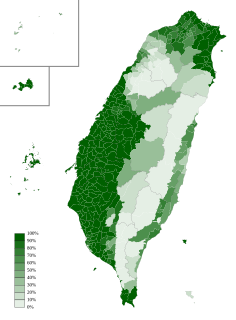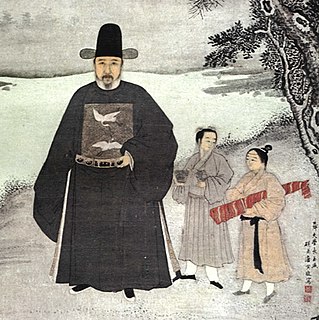Related Research Articles

Chinese is a group of language varieties that form the Sinitic branch of the Sino-Tibetan languages, spoken by the ethnic Han Chinese majority and many minority ethnic groups in Greater China. About 1.3 billion people speak a variety of Chinese as their first language.

Indonesian is the official language of Indonesia. It is a standardized variety of Malay, an Austronesian language that has been used as a lingua franca in the multilingual Indonesian archipelago for centuries. Indonesia is the fourth most populous nation in the world—of which the majority speak Indonesian, which makes it one of the most widely spoken languages in the world.

Taiwanese, also known as Taigi, Taiwanese Minnan, Holo, Taiwanese Hokkien, is a variety of the Hokkien language spoken natively by about 70% of the population of Taiwan. It is spoken by the Taiwanese Hoklo people, who descended from immigrants from southern Fujian during the Qing dynasty. The Pe̍h-ōe-jī (POJ) romanization is a popular orthography for Taiwanese.

There are several hundred languages in China. The predominant language is Standard Chinese, which is based on central Mandarin, but there are hundreds of related Chinese languages, collectively known as Hanyu, that are spoken by 92% of the population. The Chinese languages are typically divided into seven major language groups, and their study is a distinct academic discipline. They differ as much from each other morphologically and phonetically as do English, German and Danish, but meanwhile share the same writing system (Hanzi) and are mutually intelligible in written form. There are in addition approximately 300 minority languages spoken by the remaining 8% of the population of China. The ones with greatest state support are Mongolian, Tibetan, Uyghur and Zhuang.
David Parlett is a games scholar, historian, and translator from South London, who has studied both card games and board games. He is the President of the British Skat Association.

Gwoyeu Romatzyh, abbreviated GR, is a system for writing Mandarin Chinese in the Latin alphabet. The system was conceived by Yuen Ren Chao and developed by a group of linguists including Chao and Lin Yutang from 1925 to 1926. Chao himself later published influential works in linguistics using GR. In addition a small number of other textbooks and dictionaries in GR were published in Hong Kong and overseas from 1942 to 2000.

Cantonese is a language within the Chinese (Sinitic) branch of the Sino-Tibetan languages originating from the city of Guangzhou and its surrounding area in Southeastern China. It is the traditional prestige variety of the Yue Chinese dialect group, which has over 80 million native speakers. While the term Cantonese specifically refers to the prestige variety, it is often used to refer to the entire Yue subgroup of Chinese, including related but largely mutually unintelligible languages and dialects such as Taishanese.

A mandarin was a bureaucrat scholar in the history of China, Korea and Vietnam.

The Indonesian Wikipedia is the edition of Wikipedia in the Indonesian language. The Indonesian Wikipedia is the fifth-fastest-growing Wikipedia in an Asian language after the Japanese, Chinese, Korean, and Turkish language Wikipedias. It ranks 22nd in terms of depth among Wikipedias. Its first article was written on 30 May 2003, yet its Main Page was created six months later on 29 November 2003.
The Ashcombe School is a coeducational secondary school and sixth form located in Dorking in the English county of Surrey.

Bahasa Rojak or Rojak language is a Malaysian pidgin formed by code-switching among two or more of the many languages of Malaysia. Bahasa means "language", while rojak means "mixture" in Malay, and is a local food of the same name.

Iraj Bashiri is professor of history at the University of Minnesota, United States, and one of the leading scholars in the fields of Central Asian studies and Iranian Studies. Fluent in English, Persian, Tajik, and several Turkic languages, Bashiri has been able to study and translate works otherwise inaccessible to the mostly Russian-speaking Central Asian studies community. Bashiri career focus started on Iran, and engaged also with Central Asia, notably the Tajik identity and the relations between Tajiks and the Turkic people of Central Asia, namely the Uzbeks.

A Chinese independent high school is a type of private high school in Malaysia. They provide secondary education in the Chinese language as the continuation of the primary education in Chinese national-type primary schools. The language of instruction in these schools is Mandarin Chinese using simplified Chinese characters.

The Ministry of Education, abbreviated MOE, is a ministry of the Government of Malaysia that is responsible for education system, compulsory education, pre-tertiary education, technical and vocational education and training (TVET), curriculum standard, textbook, standardised test, language policy, translation, selective school, comprehensive school.

Teach Yourself is currently an imprint of Hodder Education and formerly a series published by the English Universities Press that specializes in self-instruction books. The series, which began in 1938, is most famous for its language education books, but its titles in mathematics are also best sellers, and over its long history the series has covered a great many other subjects as well. "A Concise Guide to Teach Yourself", compiled by A R Taylor, was published in 1958 and listed all the titles up until then.
There are a number of languages spoken in Brunei. The official language of the state of Brunei is Standard Malay, the same Malaccan dialect that is the basis for the standards in Malaysia and Indonesia. This came into force on 29 September 1959, with the signing of Brunei 1959 Constitution.
Arthur Raistrick was a British geologist, archaeologist, academic, and writer. He was born in a working class home in Saltaire, Yorkshire. He was a scholar in many related, and some unrelated, fields. He published some 330 articles, books, pamphlets and scholarly treatises.
Bopomofo or Mandarin Phonetic Symbols, also named Zhuyin, is a major Chinese transliteration system for Mandarin Chinese and other related languages and dialects which is nowadays most commonly used in Taiwanese Mandarin. It is also used to transcribe other varieties of Chinese, particularly other varieties of Mandarin Chinese dialects, as well as Taiwanese Hokkien. Consisting of 37 characters and four tone marks, it transcribes all possible sounds in Mandarin. Bopomofo was introduced in China by the Republican Government in the 1910s and used alongside the Wade–Giles system, which used a modified Latin alphabet. Bopomofo is an official transliteration system in Taiwan, being widely used as the main electronic input method for Mandarin Chinese in Taiwan (ROC) and used in dictionaries and other documents.
The Chinese Language Standardisation Council of Malaysia, abbreviated Yufan is the body charged with regulating the use of the Chinese language in Malaysia under Ministry of Education (Malaysia)

Chinese languages, mostly Cantonese and Mandarin, are collectively the third most-spoken language in the United States, and are mostly spoken within Chinese-American populations and by immigrants or the descendants of immigrants, especially in California and New York. Over 2 million Americans speak varieties of Chinese, with Mandarin becoming increasingly common due to immigration from mainland China and to some extent Taiwan. Despite being called dialects or varieties, Cantonese, Taishanese, and Mandarin etc. are not mutually intelligible. Nonetheless, when asked to identify their native language on forms and in surveys, speakers of these languages usually say “Chinese.”
References
- 1 2 "Quakers in Yorkshire" (PDF). 2007. Archived from the original (PDF) on October 5, 2011. Retrieved 2008-11-06.
Liz Scurfield, one of the two Joint Representatives at QCEA, was herself born in Yorkshire and became a member of the Religious Society of Friends in 1995. Before taking up her job at QCEA, Liz was Chair of Modern Languages at the University of Westminster where her specialism was Chinese.
- ↑ "Introducing QCEA's New Representatives". Around Europe No. 245. QCEA. September 2008. Archived from the original on 2008-10-26. Retrieved 2008-11-06.
Liz Scurfield: [..] In 1993 I began attending Quaker Meeting in London and became a member of Hampstead MM in 1995. [..] I co-founded the Chinese Department at the University of Westminster and am now the Chair of the Department of Modern Languages there.